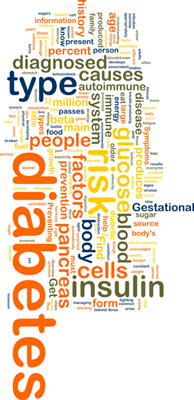 Diabetes is a long-term (chronic) condition caused by too much glucose (sugar) in the blood. It is also known as diabetes mellitus. There are two types of diabetes - type 1 and type 2.
Diabetes is a long-term (chronic) condition caused by too much glucose (sugar) in the blood. It is also known as diabetes mellitus. There are two types of diabetes - type 1 and type 2.
According to the charity Diabetes UK, more than two million people in the UK have the condition and up to 750,000 more are believed to have it without realising they do.
More than three-quarters of people with diabetes have type 2 diabetes mellitus. This used to be known as non-insulin dependent diabetes mellitus (NIDDM) or maturity-onset diabetes mellitus. The number of people with type 2 diabetes is rapidly increasing as it commoner in the overweight and obese, which is itself a growing problem.
The remainder have type 1 diabetes mellitus, which used to be known as insulin-dependent diabetes mellitus.
What's the treatment for diabetes?
It's recognised that the sooner the blood sugar levels are brought under control, the better the long term prospects of preventing damage. Lifestyle advice about diet, weight management and regular activity is the first step.
Type 1 diabetes will require immediate insulin therapy, Type 2 diabetes will first be managed with a drug called Metformin, if lifestyle changes alone aren't effective. There are now several other drugs used in type 2 diabetes, although eventually some type 2 diabetics will need insulin therapy as it's a progressive disease
Diabetes UK - How to take a blood glucose test
There is further information and education on the Diabetes UK Video Site
Useful Links
Diabetes Type 2 - Healthtalk
![]() Healthtalk online, an award-winning charity website, lets you share in other people's experiences of health and illness. An excellent resource compiled after interviewing a wide range of people suffering from heart disease.
Healthtalk online, an award-winning charity website, lets you share in other people's experiences of health and illness. An excellent resource compiled after interviewing a wide range of people suffering from heart disease.
Diabetes UK
Largest charity in the UK devoted to the care and treatment of people with diabetes in order to improve the quality of life for people with the condition
NHS
Further information about symptoms, treatment, causes and prevention of Diabetes
These links all come from trusted resources but if you are unsure about these or any other medical matters please contact your doctor or pharmacist for advice.

